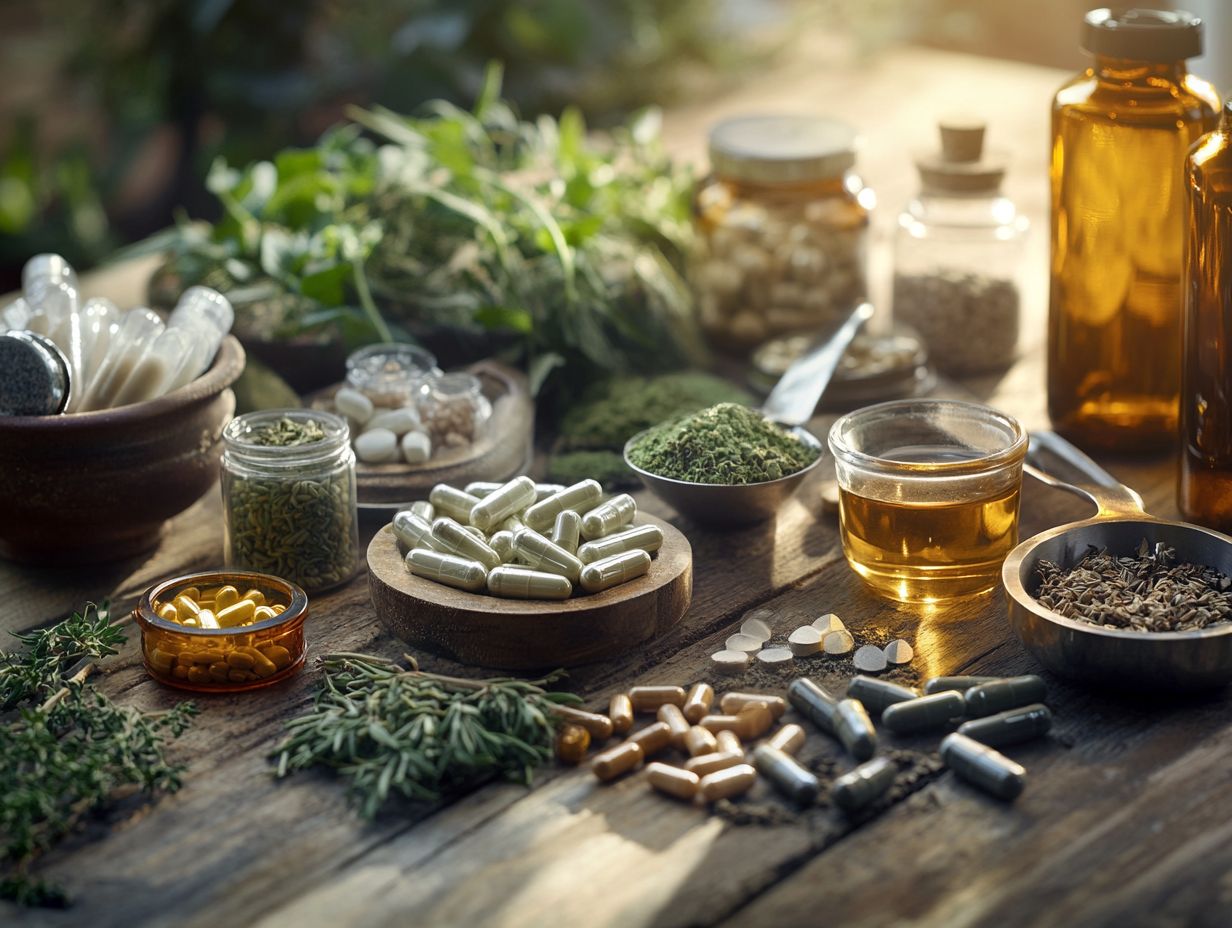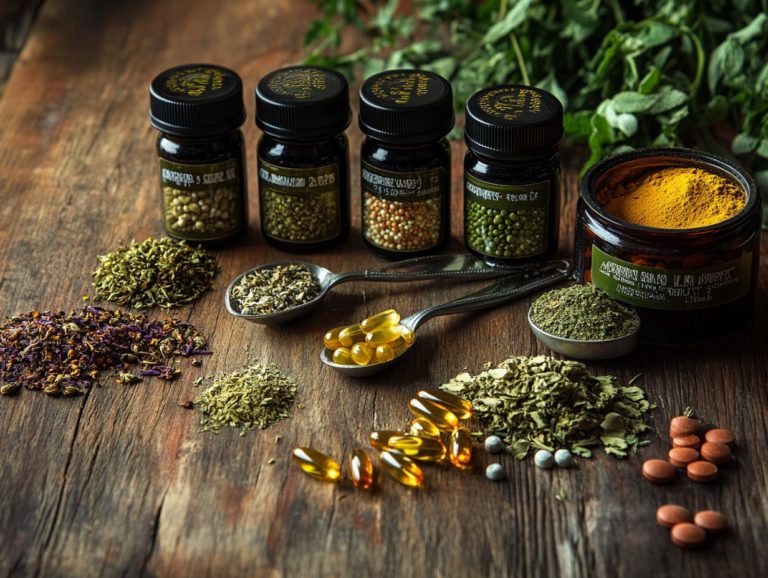5 Myths About Herbal Dosage Debunked
Herbal supplements and other natural health products have surged in popularity recently, often celebrated as natural solutions for a variety of health concerns.
However, with this enthusiasm comes a swirl of myths that can cloud your understanding of their safety and effectiveness, particularly concerning dietary supplements.
This article aims to debunk five prevalent myths surrounding herbal supplements, addressing crucial aspects like safety, dosage, quality standards, and potential interactions with medications.
You ll also discover how to pinpoint the right dosage tailored to your needs, along with practical tips for taking these supplements safely.
Dive in as we clarify the facts, empowering you to make informed decisions about your health.
Contents
- Key Takeaways:
- 1. Myth #1: All Herbal Supplements Are Safe and Have No Side Effects
- 2. Myth #2: You Can Take Any Amount of Herbal Supplements Without Any Harm
- 3. Myth #3: Herbal Supplements Do Not Interact with Medications
- 4. Myth #4: The Dosage for Herbal Supplements Is the Same for Everyone
- 5. Myth #5: Higher Dosage Means Better Results
- What Is the Recommended Dosage for Herbal Supplements?
- What Factors Can Affect the Dosage of Herbal Supplements?
- How Can One Determine the Right Dosage for Themselves?
- What Are the Potential Risks of Taking the Wrong Dosage of Herbal Supplements?
- Are There Any Herbal Supplements That Should Be Taken in Higher Dosages?
- What Are Some Tips for Safely Taking Herbal Supplements?
- Frequently Asked Questions
- What Are Some Common Misconceptions About Herbal Dosage?
- Myth #1: Herbal Dosage Is Not Important
- Myth #2: All herbs can be taken in unlimited amounts
- Myth #3: More is always better when it comes to herbal remedies
- Myth #4: Herbal remedies are completely safe
- Myth #5: All forms of herbs have the same dosage
Key Takeaways:

- All herbal supplements should always be used cautiously and discussed with your healthcare provider.
- The dosage for herbal supplements varies and should be carefully determined based on factors such as age, health conditions, and medications being taken.
- Higher dosage does not necessarily mean better results and can actually increase the risk of side effects and interactions with medications.
1. Myth #1: All Herbal Supplements Are Safe and Have No Side Effects
The common belief that all herbal supplements are inherently safe and free from adverse effects is a deeply ingrained myth, often fueled by a lack of scientific backing and understanding among both health professionals and consumers.
Many people turn to natural health products, thinking they re a quick fix for various health issues. In reality, some supplements can carry significant and potentially harmful side effects if not properly monitored.
Take St. John’s Wort, for example. It is often hailed as a remedy for depression, but it has the potential to interact with several prescription medications, diminishing their effectiveness and leading to serious complications.
While vitamin C is widely celebrated for its immune-boosting qualities, too much of it can result in gastrointestinal disturbances.
These instances underscore the vital importance of quality standards and regulations, like those enforced by Health Canada. Ensuring that consumers are using herbal supplements safely is crucial.
Therefore, consulting with a healthcare professional before embarking on any supplement regimen is essential for understanding potential risks and safeguarding your overall health.
2. Myth #2: You Can Take Any Amount of Herbal Supplements Without Any Harm
The notion that one can consume an unlimited amount of herbal supplements without any repercussions is misleading and potentially dangerous.
It s essential to understand that appropriate dosage is key to ensuring both efficacy and safety, especially when managing chronic diseases.
Health professionals emphasize knowing the right dosage to prevent adverse effects and to truly reap the health benefits offered by these natural products.
For example, consuming St. John’s Wort excessively can lead to serious interactions with medications prescribed for conditions like depression or anxiety. This can result in a severe condition known as serotonin syndrome, which refers to an overdose of serotonin, a neurotransmitter in the brain.
Some herbal supplements may not be suitable for individuals with chronic conditions such as diabetes or hypertension. This highlights the urgent need for healthcare providers to carefully assess personal health profiles before recommending specific dosages.
Enhancing overall well-being involves more than just herbal remedies. Integrating therapeutic massage and adopting healthier lifestyle changes like improved nutrition and regular exercise can create a holistic approach to health.
This highlights the urgent need to use supplements cautiously and under professional guidance.
3. Myth #3: Herbal Supplements Do Not Interact with Medications
The notion that herbal supplements are exempt from interacting with prescription medications is not only misleading but also potentially dangerous.
Numerous studies have highlighted significant interactions that can impact medication efficacy and lead to adverse effects. As a patient, it’s crucial to recognize that health professionals are increasingly aware of these interactions, especially since many individuals use herbal products like Ginkgo biloba alongside prescribed treatments.
While you might view these herbal supplements as safe alternatives, they can have serious implications. For instance, Ginkgo biloba can increase the risk of bleeding when paired with anticoagulants, which are medications that help prevent blood clots.
Similarly, St. John s Wort is notorious for diminishing the effectiveness of medications, including antidepressants and birth control pills. Therefore, it is essential for healthcare providers to foster open conversations about all supplements you may be using, ensuring that safety remains a top priority.
Share your supplement use openly with your healthcare provider! Thorough communication can greatly enhance the overall effectiveness of your treatment plan, protecting you from unintended consequences.
4. Myth #4: The Dosage for Herbal Supplements Is the Same for Everyone

The idea that there s a one-size-fits-all dosage for herbal supplements neglects the intricacies of individual health needs and reactions. Your health response can fluctuate significantly based on factors like lifestyle, age, and existing conditions.
A customized approach is vital in determining the right dosage that meets quality standards for you. Recognizing that personalized health strategies often championed by health professionals are essential for your well-being is key.
This customized approach maximizes the effectiveness of herbal supplements while reducing the risk of adverse effects. Health professionals evaluate various personal factors such as your medical history, current medications, and specific health goals.
By considering these elements, they guide you through the often-overwhelming world of herbal remedies. Additionally, being aware of common herbal dosage mistakes to avoid ensures that the dosages you receive are both safe and tailored to tackle your unique health challenges effectively.
5. Myth #5: Higher Dosage Means Better Results
The notion that higher dosages of herbal supplements will automatically lead to better health outcomes is not only misguided but can also be harmful, particularly when navigating serious illnesses where precise dosing is crucial.
Remember, more isn t always better! Knowing the correct dosage for each supplement, like vitamin C, is vital for managing your health effectively.
Healthcare professionals note that exceeding recommended levels can often lead to adverse effects instead of the desired benefits. For instance, you might think that taking high doses of vitamin C will supercharge your immune system, but too much can lead to digestive issues and other complications you definitely want to avoid.
Experts recommend personalized protocols that take your unique health status and needs into account. Consulting healthcare providers before altering your supplement intake is essential.
Striking a careful balance with dosages enhances efficacy and minimizes potential risks.
What Is the Recommended Dosage for Herbal Supplements?
Finding the recommended dosage for herbal supplements is a careful process. It’s important to pay attention to scientific evidence, quality standards, and your unique health needs.
Always consult qualified health professionals. They can help you assess these factors effectively.
Each herbal supplement, like probiotics or turmeric, has its own guidelines. Following these is crucial for safe and effective use.
Your age, body weight, overall health, and possible interactions with medications are key factors in determining the right dosage for you. Trusted experts, such as those at the National Institutes of Health, provide detailed recommendations based on extensive clinical studies.
These guidelines help you avoid adverse effects while ensuring you get the benefits you seek.
When considering herbal supplements, talk with your healthcare provider. They can give personalized advice and monitor your progress, prioritizing your safety and effectiveness throughout your supplementation journey.
What Factors Can Affect the Dosage of Herbal Supplements?
Several key factors can influence the recommended dosage of herbal supplements. Consider your age, weight, existing health conditions, and lifestyle changes.
For example, your age may affect how your body absorbs these supplements. Younger individuals often respond differently than older adults, who may experience slower metabolism.
Weight is also important; you might need higher dosages if you weigh more. In contrast, those who weigh less often do well with lower doses.
Pre-existing health conditions can complicate the use of certain herbs. They may interact with medications or worsen health issues.
Lifestyle factors like stress and diet also impact how your body uses these supplements. Health professionals consider all this information to optimize safety and effectiveness for you.
How Can One Determine the Right Dosage for Themselves?

To find the right dosage for herbal supplements, blend personal research with professional consultations. Adhering to quality standards will ensure your safety and the product’s effectiveness.
Assess your current health conditions, noting allergies or existing issues that could affect your reactions to certain herbs. Conduct research on the supplements you’re interested in, reviewing peer-reviewed studies and consumer feedback.
Seeking advice from a qualified healthcare provider can yield tailored recommendations that fit your specific needs. This collaborative approach, along with understanding quality labels, ensures you choose reputable and effective products.
What Are the Potential Risks of Taking the Wrong Dosage of Herbal Supplements?
Taking the wrong dosage of herbal supplements can expose you to a range of potential risks, including adverse effects, ineffective treatment for long-term health issues, and even serious health problems. This reality emphasizes the importance of seeking proper dosage guidance from health professionals. By understanding these risks, you enable yourself to make informed choices and prioritize your safety when using natural health products.
Research has indicated that incorrect dosages can vary significantly among individuals due to factors such as age, weight, and pre-existing medical conditions. For instance, a study published in the journal *Phytotherapy Research* highlighted instances where excessive intake of certain herbs resulted in liver damage, underscoring the dangers of self-prescription. To ensure safety, it’s crucial to understand how to measure herbal dosages accurately.
Experts recommend involving trained practitioners, as they can tailor dosages to meet your specific needs, ensuring effectiveness while minimizing risks. This professional oversight is especially crucial for those who are integrating supplements with prescription medications, as interactions could exacerbate health issues rather than alleviate them.
Are There Any Herbal Supplements That Should Be Taken in Higher Dosages?
While most herbal supplements require careful dosage management, there are certain products that may benefit from higher dosages, especially when treating health problems. For example, vitamin C for immune support or turmeric for inflammation. It’s essential to make these decisions in consultation with health professionals to ensure both safety and efficacy.
Clinical studies indicate that high doses of omega-3 fatty acids can offer significant advantages for individuals with chronic inflammatory conditions, enhancing heart health and alleviating joint pain. Similarly, higher doses of magnesium may help relieve anxiety symptoms, but it s crucial to tailor each dosage to your unique health status.
These guidelines underscore the importance of professional oversight to monitor potential interactions and side effects, ensuring that any increase in intake aligns with your specific health needs and goals. Ultimately, making informed decisions based on expert advice strikes the right balance between reaping therapeutic benefits and maintaining safety.
What Are Some Tips for Safely Taking Herbal Supplements?
Taking herbal supplements safely requires you to follow specific guidelines. This includes consulting with health professionals, understanding quality standards, and being mindful of interactions with other medications. By doing so, you ll ensure a holistic approach to your health.
Following these tips allows you to maximize the benefits of herbal supplements while minimizing any potential risks.
When incorporating these supplements into your daily routine, prioritizing quality assurance is key. Choose products that have been verified by third-party testing to ensure their potency and purity.
Since each person has a unique health profile, seeking personalized advice is essential. Discussing specific supplements with your healthcare provider can provide you with tailored guidance.
Pay close attention to any adverse effects after starting a new supplement, as this can offer valuable insights into its compatibility with your health.
Maintaining open and ongoing communication with healthcare professionals creates a supportive environment for safe use and enables you to make informed choices that enhance your overall well-being.
Frequently Asked Questions

What Are Some Common Misconceptions About Herbal Dosage?
Some of the most common myths about herbal dosage include the idea that “more is always better,” that all herbs can be taken in unlimited amounts, and that herbs are completely safe and have no potential for harm.
Myth #1: Herbal Dosage Is Not Important
This is a dangerous misconception. Just like with any other medication, the dosage of herbal remedies is crucial for achieving the desired effect and avoiding potential side effects. Too much or too little can have negative consequences.
Myth #2: All herbs can be taken in unlimited amounts
Some herbs are safe in large amounts, but others can be toxic or even fatal. Research the proper dosage for each herb and follow recommended guidelines.
Myth #3: More is always better when it comes to herbal remedies
This is not true. Taking too much of an herbal remedy can lead to serious health problems.
Myth #4: Herbal remedies are completely safe
Many herbs have a long history of safe use. However, they can still interact with medications or cause side effects.
Myth #5: All forms of herbs have the same dosage
This is incorrect. The dosage of an herb varies based on its form, such as dried, powdered, or liquid extract.






